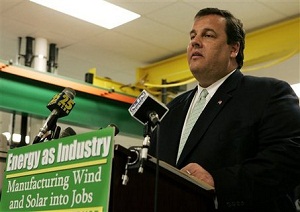Welcome to the new green economy, New Jersey—kind of
 The long-awaited decision from the Christie administration arrived on Dec. 7—New Jersey's Energy Management Plan (EMP) was adopted with some stabilizing changes for solar.
The long-awaited decision from the Christie administration arrived on Dec. 7—New Jersey's Energy Management Plan (EMP) was adopted with some stabilizing changes for solar.
The state intends to accelerate the amount of electricity required from solar. If there are not enough solar renewable energy credits (SRECs) for electric companies to purchase, the penalty will be reduced. The savings get passed onto the ratepayers. Additionally, the Board of Public Utilities is in the process of tallying the number of solar projects in the pipeline to help developers accurately project the future supply of SRECs.
"That would alleviate us from being in the same predicament we’re in as we speak,” said Jamie Hahn, managing partner of Solis Partners in Manasquan, N.J.
Hahn was pleasantly surprised by the decisions, as was prominent trade group Mid-Atlantic Solar Energy Industries.
“The things we need are there,” said Lyle Rawlings, Vice President of Mid-Atlantic Solar Energy Industries.
Energy Distribution Company (EDC) long-term contracting was also endorsed, which is a kudos for Public Service Electric and Gas (PSE&G) company. Other EDCs have their heels dug into the ground, not at all interested in these programs. Their public comments from N.J. Solar Transition Groups reflect a wait and see approach, i.e. let the federal rebate dust settle and allow Rutgers University’s economists to measure societal benefits for the ratepayers.
Not so slow, said Governor Christie.
"The EMP offers concrete strategies to reduce some of the nation's highest energy rates and make them comparable to costs in other regions and states, which is consistent with the recommendations of the State Strategic Plan for facilitating economic growth and lowering the cost of living for New Jersey residents," said Gov. Christie in a release.
According to the adopted EMP, the NewJersey clean energy portfolio will be 70 percent. However, 51 percent will come from nuclear. The solar sector of clean energy still has some sibling battles with nuclear energy to slug out (or sludge out).
The Oyster Creek nuclear power plants will be out of service in 2019, so there’s plenty of time for New Jersey environmentalists to politically push back and carve out the word “clean” for skies.
Image courtesy of NJ.com.



